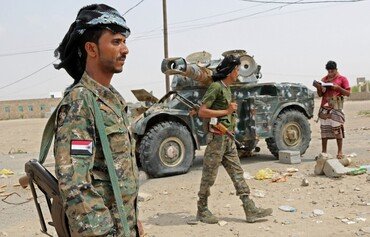Yemeni separatists on Thursday (August 29th) regained full control of Aden following clashes with government forces, who withdrew from the southern port city, security officials from both sides said.
The separatists brought massive reinforcements from other regions in what appeared to be a fresh effort to seize the nearby provinces of Abyan and Shabwa from government forces.
"The Security Belt force completely controls the city of Aden along with its entrances," said Southern Transitional Council (STC) spokesman Haitham Nezar.
A government security source confirmed Aden was under the full control of the STC, saying government troops who entered parts of the city a day earlier "withdrew from Aden" to Abyan province.
The internationally recognised government of President Abd Rabbu Mansour Hadi on Wednesday said it had reclaimed Aden from separatists who captured the city on August 10th after a deadly battle.
Nezar said the Security Belt Forces were now setting their sights on Abyan and Shabwa, which had been retaken by government troops earlier this week.
A new front in Yemen's war
The Yemeni government has drafted in reinforcements from the north as the two parties appear to be preparing for a major showdown for supremacy in the south of the country.
Meanwhile, thousands of troops from the Security Belt Forces, dominated by the STC, were recalled from several parts of the country, including from the Red Sea port city of al-Hodeidah, to reinforce the separatists in Aden.
STC vice president Hani bin Breik said forces fighting against the Iran-backed Houthis (Ansarallah) in the north were sent to the south for a major battle.
The STC is fighting to regain the independence of South Yemen which unified with the north in 1990.
The clashes between the two sides -- which for years have fought alongside each other against the Houthis -- have raised fresh concerns.
US Secretary of State Mike Pompeo, meeting in Washington with Saudi Arabia's deputy defence minister, Prince Khalid bin Salman, called for a negotiated resolution with STC forces.
Pompeo and the prince "agreed that dialogue represents the only way to achieve a stable, unified and prosperous Yemen," the US State Department said.
Preventing extremist resurgence
Yemen’s government said its bid to recapture Aden, Abyan and Shabwa from separatists was aimed at imposing state control to confront the Houthis and fill security vacuums that extremist groups might exploit.
In a meeting of the Marib security committee on Wednesday (August 28th), Prime Minister Moeen Abdulmalik stressed that the state rejects any military or security structures outside state institutions.
Speaking to local media, he said the STC's seizure of Aden and its aggression in Abyan and Shabwa "are clear indications of the seriousness of this matter and its catastrophic repercussions on state institutions and their functions".
The STC's moves "open the door for terrorist groups to expand and exploit this situation", he added.
The Interior Ministry meanwhile called on STC leaders to respond to the government's call to join Yemeni forces in recovering Yemen from the Houthis, ministry public relations director Brig. Gen. Abdul Qawi Baash told Al-Mashareq.
"After that, they can look for solutions to the southern issue, in consultation with all southern forces," he said.
UN envoy to Yemen Martin Griffiths warned on August 22nd that chaos and fragmentation of security could allow the re-emergence of extremist groups.
He noted that in July alone, both al-Qaeda and ISIS had launched attacks in Aden, Abyan and al-Bayda.
Further fragmentation of security in Aden and other areas could allow these activities to expand and gain momentum once again with terrible consequences for the civilian population and the prospects for future stability, Griffiths said.
Calls for STC forces to withdraw
Deputy Minister of Human Rights Nabil Abdel-Hafeez told Al-Mashareq that some state offices and institutions in Aden have been vandalized and looted.
He warned against any interference by any party in the supervision of the work of state institutions "so as not to increase the suffering of citizens", calling on STC forces to withdraw from all state institutions and facilities.
He stressed the importance of "restoring security and stability and merging the various military and security units under the command of the ministries of interior and defence".
This will allow these authorities to "counter any move by al-Qaeda or ISIS or elements of the Houthi militias towards the south to take advantage of these difficult circumstances", he said.
Lawyer and human rights activist Abdul Rahman Berman also warned that the STC’s clashes with Yemen government forces may create a favorable environment for "the return of terrorist activities by al-Qaeda and ISIS".
Meanwhile, he added, difficult circumstances are not limited to security.
"The STC coup caused a disruption in the provision of services to citizens, with electricity getting cut off for more than 17 hours," he said earlier this week.
"The Passports and Civil Status Authority and Aden airport also suspended operations, compounding the suffering of citizens, particularly patients," he added.

![Fighters of the Security Belt Forces, dominated by members of the Southern Transitional Council, patrol a street near the Aden airport on August 28th. [Nabil Hasan/AFP]](/cnmi_am/images/2019/08/29/19679-Yemen-Aden-patrol-600_384.jpg)





Aden is at the hands of its southern people, not as you write. We’re Sunnis and don’t follow the Persians. The South is Arab, and everyone knows it.
Reply1 Comment(s)